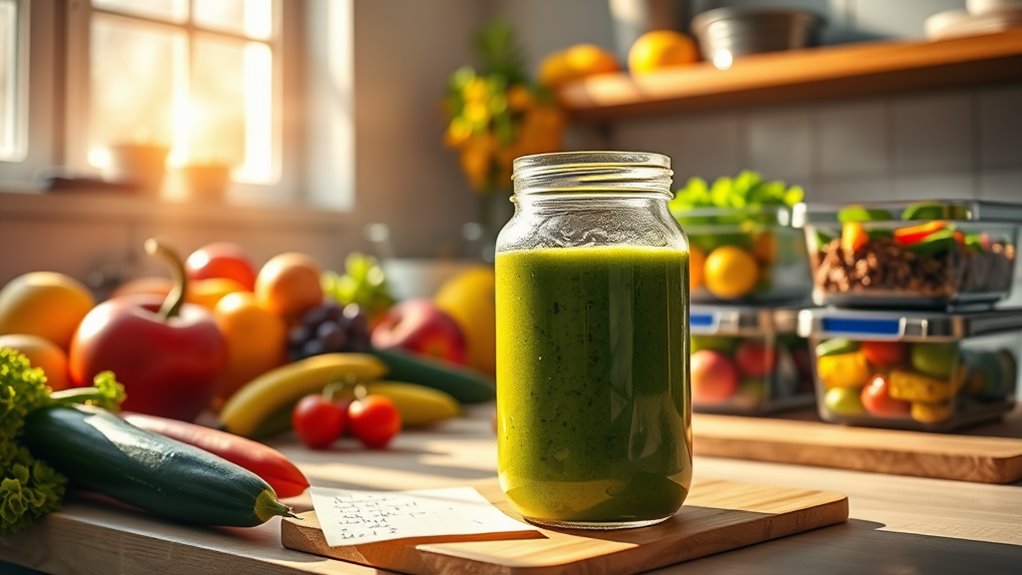The One Daily Habit That Can Make or Break Your Weight Loss!
If you’re on a weight loss journey, there’s one habit that could truly make or break your success: food journaling. It might sound simple, but tracking what you eat can shine a light on your choices and help you spot patterns. You may be surprised to find out how small bites and snacks add up. Curious about how to start this habit and what to include? Let’s explore the key elements that can set you up for lasting change.
The Science Behind Food Journaling and Weight Loss
When you think about losing weight, it’s easy to get overwhelmed by all the diets, workouts, and advice floating around, but have you ever considered the power of food journaling?
This daily habit for weight loss can be a game-changer. By simply writing down what you eat, you become more aware of your choices, helping you spot patterns and triggers.
It’s like holding a mirror to your eating habits, revealing those sneaky snacks and portion sizes you mightn’t notice otherwise. Plus, tracking your meals can motivate you to make healthier decisions.
With each entry, you’re not just logging food; you’re building a roadmap to success. So grab a notebook or an app, and start your journey today!
How to Start and Maintain a Food Journal
Ever wondered how to kickstart your food journaling journey? It’s easier than you think! First, grab a notebook or download an app—whatever feels right for you.
Next, commit to writing down everything you eat and drink, even those sneaky snacks. Don’t stress about perfection; just be honest with yourself. Aim to jot down your meals right after eating, so you don’t forget.
To keep it going, set a daily reminder—maybe during your morning coffee or right before bed. Celebrate your progress, even if it’s small, and don’t be too hard on yourself if you miss a day.
Key Elements to Include in Your Food Journal
To make your food journal truly effective, it’s essential to include key elements that help you stay on track and reflect on your eating habits.
Start by noting down everything you eat and drink, including portion sizes. Don’t forget to add the time you ate—trust me, it matters!
Next, jot down how you felt before and after each meal. Were you hungry, stressed, or bored? This insight can reveal patterns you mightn’t notice otherwise.
Also, consider adding a section for your cravings; understanding what triggers them can help you resist temptation.
Lastly, track your water intake—it’s just as important as food.
Overcoming Common Challenges in Food Tracking
Tracking your food can feel like a juggling act, especially when life gets busy or overwhelming. You might forget to log meals or feel too tired after a long day.
Don’t stress! Start small—set reminders on your phone or use an app that makes tracking fun. If you’re dining out, snap a quick photo of your meal to help you remember later.
Also, don’t worry about being perfect; it’s about progress, not perfection. If you miss a day, just jump back in! Keep your journal handy, and write down your feelings too. It’ll help you understand your eating habits better.
Real-Life Success Stories: Transformations Through Journaling
Many people have found that journaling can be a game-changer on their weight loss journeys.
Take Sarah, for example. She started jotting down her meals and feelings every day, and it opened her eyes to emotional eating triggers. By recognizing patterns, she swapped late-night snacks for healthier options, shedding 20 pounds in just a few months!
Then there’s Mike, who struggled with consistency. After a few weeks of journaling, he discovered that planning his meals made all the difference. He lost 30 pounds and feels more energized than ever.
These real-life transformations show how powerful journaling can be. It’s not just about tracking calories; it’s about understanding yourself, staying motivated, and celebrating every small victory along the way!
Tips for Making Food Journaling a Sustainable Habit
Journaling can be a powerful tool for weight loss, but sticking with it is where many people hit a wall. To make food journaling a sustainable habit, here are some tips you can try:
-
Set a specific time each day to journal; consistency helps build a routine.
-
Keep it simple; don’t overthink it! Just jot down what you eat and drink.
-
Use apps or templates to make logging easier and more fun; technology’s on your side!
-
Celebrate small wins; recognize your efforts, even if it’s just logging a few days in a row.





